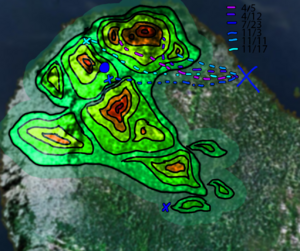Spiderjjr45 (talk | contribs) No edit summary |
Spiderjjr45 (talk | contribs) No edit summary |
||
| Line 2: | Line 2: | ||
==About== |
==About== |
||
=== Geography === |
|||
This mountain range is situated on the north western most portion of the continent of [[Isonhound]]. The larger mountains are perpetually covered in snow on their upper regions. These barren jagged upper regions tower over the lush, tree covered lower foothills that stretch out from the mountains to the east and south. The foothills are teeming with both flora and fauna. |
This mountain range is situated on the north western most portion of the continent of [[Isonhound]]. The larger mountains are perpetually covered in snow on their upper regions. These barren jagged upper regions tower over the lush, tree covered lower foothills that stretch out from the mountains to the east and south. The foothills are teeming with both flora and fauna. |
||
| Line 7: | Line 9: | ||
Snowy storms swirl constantly around the peaks of the mountains and they are, more than often, shrouded in fog due to this activity. The mountain range acts as a natural barrier from the strong winter weather that batters Isonhound from Breme. |
Snowy storms swirl constantly around the peaks of the mountains and they are, more than often, shrouded in fog due to this activity. The mountain range acts as a natural barrier from the strong winter weather that batters Isonhound from Breme. |
||
=== Fauna === |
|||
Several tribes of [[Orc|Orcs]] are known to live in the mountains at various times of history. However many of them were driven out of the mountains in the 800s [[PR]] with the introduction of [[Cheshire's Goblins]] into the region, as well as a number of new nesting [[Dragon|Dragons]] such as [[Longfang]]. |
|||
==History== |
==History== |
||
Revision as of 01:48, 1 April 2024
About
Geography
This mountain range is situated on the north western most portion of the continent of Isonhound. The larger mountains are perpetually covered in snow on their upper regions. These barren jagged upper regions tower over the lush, tree covered lower foothills that stretch out from the mountains to the east and south. The foothills are teeming with both flora and fauna.
On the North Western face of the mountains one would find only uninviting rocky outcroppings that plunge into the Viridant Sea that divides Isonhound from Breme. The waters that separate the two continents echo the wild activity of the weather that flows from Breme to the mountains. Many a ship have been lost in these waters as the winds wreak havoc on even the best sailors skills and send them smashing against the stone of the mountains.
Snowy storms swirl constantly around the peaks of the mountains and they are, more than often, shrouded in fog due to this activity. The mountain range acts as a natural barrier from the strong winter weather that batters Isonhound from Breme.
Fauna
Several tribes of Orcs are known to live in the mountains at various times of history. However many of them were driven out of the mountains in the 800s PR with the introduction of Cheshire's Goblins into the region, as well as a number of new nesting Dragons such as Longfang.
History

The Northern Snowy Mountains have existed as long as Isonhound. It would also seem that the dwarves that lived in the dwarven citadel beneath it have been there just as long. For hundreds of years trade routes through the foothills into the base of the mountains thrived as products of the races above such as cloth, wood and produce flowed into the dwarves. In return, a steady stream of precious stone, metal and gem artistry flowed out. The skill of the dwarven artists was well known and often unmatched.
This was the case until the time of the Holy War against the dragon Tiamat. Many dwarves answered the call of the god Moradin to rally to battle against the dragon. But as soon as these crusaders left the mountain, trade with the outside world ceased. Messengers were sent to the mountain requesting aid from the dwarves that were battling Tiamat and her children. But each time the doors were found barred and no response was ever given.
Any villages and way stations that had survived on the trade with the dwarves became obsolete and were abandoned by the residents. Many of these locations still pockmark the lower and upper foothills as shadows of their former selves. The natural landscape quickly reclaimed many of these locations as well as the roads between them and into the mountain citadel.
When the war had ended and the remaining dwarven troops looked to return home, they either decided not to, or could not. The facts surrounding this circumstance are still unclear. In any case, the bulk of these troops settled about 2 days' travel out of the foothills and founded a town by the name of Gammelgard on the remains of an abandoned coastal fishing village in approximately 990 BR.
Since then, there has been little in the way of either exploration or settlement in the foothills. The locations of the entrances into the mountains are all but forgotten. The land itself is not worth settling seeing as anything that can be raised in the foothills can be done so on lower elevations, closer to civilization and away from many of the monsters that occupy the region.
Notable Places
The Dwarven Citadel
Notable Events
990 BR - The closing off of the Citadel

